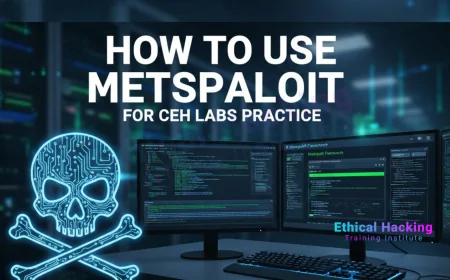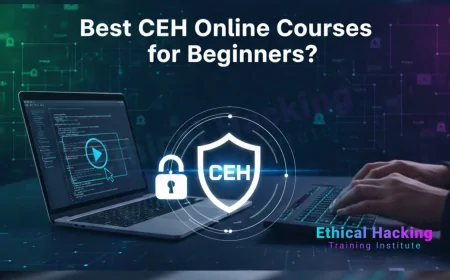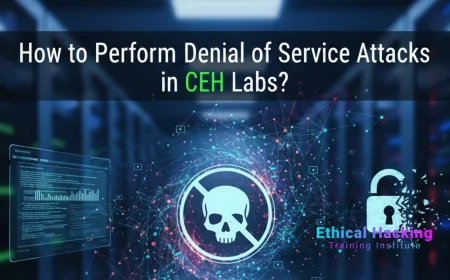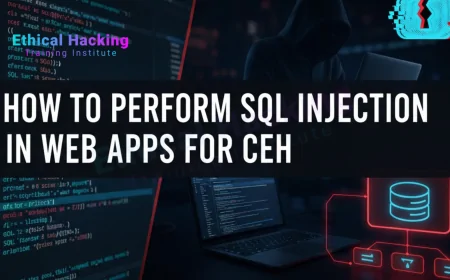CEH Training and Certification: How to Get Started and Achieve Success | Beginner’s Guide to CEH Training and Certification Success
Learn how to start your CEH training journey, prepare for certification, and build a successful career in ethical hacking with this step-by-step guide.
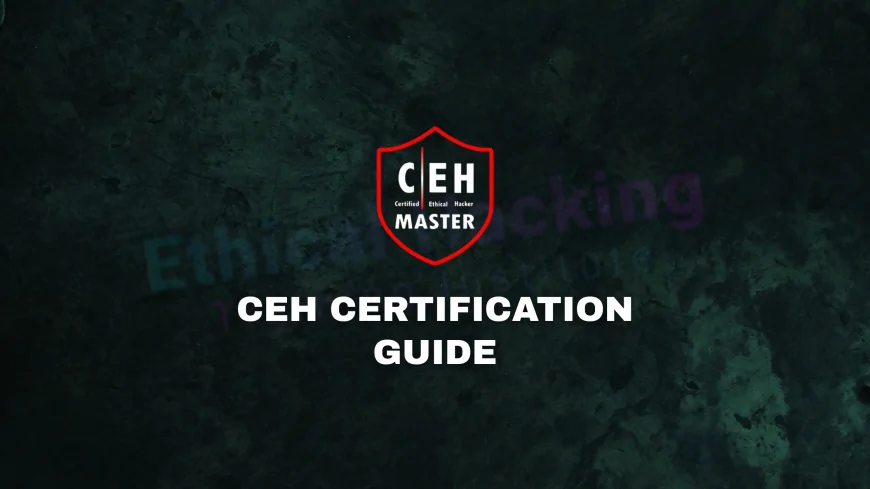
Table of Contents
- Introduction
- Understanding CEH and Its Role
- Why Choose the CEH Certification?
- Eligibility and Prerequisites
- CEH Training Pathways
- CEH Curriculum Breakdown
- Exam Format & Details
- Hands-On Practice Strategies
- Effective Study Strategies
- Lab Environments and Tools
- Mock Tests & Self-Assessment
- Pre-Exam Preparation Tips
- Exam-Day Best Practices
- Maintaining and Renewing CEH
- Career Opportunities Post-CEH
- Realistic Learning Timeline
- Cost vs ROI Analysis
- Top Mistakes to Avoid
- Recommended Resources & Communities
- FAQs
- Conclusion
Introduction
Embarking on a journey to become a Certified Ethical Hacker (CEH) is both exciting and demanding. As cyber threats grow, the CEH certification—offered by EC-Council—equips professionals with the knowledge and hands-on skills required to identify system vulnerabilities before malicious hackers do. This guide will walk you through everything: from understanding CEH’s value and training methods to exam strategies, real-world practice, and long-term career growth.
Understanding CEH and Its Role
CEH verifies your ability to ethically use hacking techniques to uncover vulnerabilities. Areas covered include network scanning, web application exploits, malware analysis, social engineering, and cloud/IoT security. It’s globally respected and often requested by employers in security, finance, government, and defense.
Why Choose the CEH Certification?
- Globally recognized: Accepted in 140+ countries and government agencies.
- Vendor-neutral: You'll learn industry-standard tools like Nmap, Metasploit, Burp Suite, and Wireshark.
- Career boost: CEH holders typically earn higher salaries in penetration testing, SOC, and cybersecurity roles.
- Foundation for advanced credentials: Useful stepping stone to OSCP, CISSP, and GPEN.
Eligibility and Prerequisites
You can attempt the CEH exam via two paths:
- Attend official training: Choose EC-Council-accredited online or classroom training.
- Prove experience: Submit 2 years of verified cybersecurity work experience and get eligibility approval.
No specific academic qualifications are necessary, but an understanding of TCP/IP, Linux, and basic scripting enhances readiness.
CEH Training Pathways
- Instructor-led classroom training: Interactive sessions over 5 days (40 hours).
- Live online training: Remote but real-time classes with labs.
- Self-paced online courses: Learn at your own pace, often paired with iLabs access.
- Hybrid programs: Combine online theory with in-person lab sessions.
CEH Curriculum Breakdown
The CEH curriculum spans 20 modules, including:
- Introduction to Ethical Hacking
- Footprinting & Reconnaissance
- Scanning & Enumeration
- System Hacking & Malware Threats
- Sniffing, Social Engineering, DoS
- Session Hijacking, Evasion Techniques
- Web, Wireless, Mobile, Cloud/IoT Hacking
- Cryptography, Threat Intelligence
The 2025 CEH version includes additional practical focus, MITRE ATT&CK alignment, and real-world case studies.
Exam Format & Details
- Exam code: 312-50
- Questions: 125 MCQs
- Duration: 4 hours
- Passing score: Typically 60–85%
- Delivery: Via Pearson VUE centers or online remote proctoring
Hands-On Practice Strategies
- EC-Council iLabs: Cloud-hosted, interactive lab exercises.
- TryHackMe & Hack The Box: Experience real-world pentesting through gamified learning on platforms like Hack The Box and TryHackMe.
- Personal lab setup: Use VirtualBox or AWS to build vulnerable VMs.
- Capture-The-Flag events: Join CTF competitions to sharpen real-time problem-solving.
Effective Study Strategies
- Create a weekly study plan with defined module targets.
- Combine theory and labs daily to reinforce learning.
- Join study groups, Discord/Slack communities, and cybersecurity forums.
- Use note-taking tools and flashcards for technical terms & concepts.
Lab Environments and Tools
Essential tools and environments for CEH training include:
- Kali Linux: Designed for ethical hackers, Kali Linux bundles critical tools like Metasploit, Hydra, Nmap, and Burp Suite.
- Wireshark: Use Wireshark to inspect, filter, and analyze detailed network traffic data
- Nessus/OpenVAS: Automate vulnerability scanning.
- VirtualLab: Create isolated VMs for attack simulations.
Mock Tests & Self-Assessment
- Tip: Start mock tests 4 weeks before the exam.
- Use timed conditions to simulate exam stress.
- Review detailed explanations for missed questions.
- Schedule mock exams weekly until achieving 80% consistently.
Pre-Exam Preparation Tips
- Revise module summaries and tool commands.
- Ensure consistent daily lab practice.
- Sleep well the night before—mental clarity is key.
Exam-Day Best Practices
- Arrive early if in-person, or test system readiness for online proctoring.
- Read each MCQ carefully; eliminate incorrect options methodically.
- Flag difficult questions for review, then return later.
- Manage time—4 hours for 125 questions gives ~1.8 minutes per question.
Maintaining and Renewing CEH
The CEH certificate is valid for 3 years. To maintain it:
- Earn **120 EC-Council Continuing Education (ECE)** credits via courses, webinars, volunteering.
- Alternatively, retake the CEH exam.
Career Opportunities Post-CEH
- Penetration Tester
- SOC Analyst
- Security Consultant or Engineer
- Bug Bounty Hunter
- Cybersecurity Manager
CEH helps open doors in finance, tech, government, and military sectors worldwide.
Realistic Learning Timeline
Our suggested 6-month schedule:
- Months 1–2: Networking fundamentals + Linux basics
- Months 3–4: Core CEH modules + iLabs practice
- Month 5: Practice exams + review weak areas
- Month 6: Intensive mock tests + exam day
Cost vs ROI Analysis
- CEH training + exam voucher cost: ~$900–1 500 USD, depending on delivery mode and region.
- Salary uplift: Certified professionals earn on average 15–25% more than peers.
- Career growth: CEH provides a foundation for strategic roles and advanced certifications.
Top Mistakes to Avoid
- Skipping hands-on labs and relying solely on theory.
- Studying only book content without practicing command usage.
- Underestimating exam time management.
- Ignoring lab documentation and report-writing skills.
Recommended Resources & Communities
- **EC-Council official courseware & iLabs**
- **TryHackMe**, **Hack The Box**
- **Reddit r/ceh**, **r/netsecstudents**, and **Stack Exchange Security**
- **Books**: “CEH v12/v13 Certified Ethical Hacker All-in-One Exam Guide”
FAQs
1. Is CEH suitable for someone with no IT background?
Yes, you can bridge the gap with foundational courses in networking and Linux before starting CEH.
2. How long does it take to prepare?
Aim for 4–6 months of part-time study, including labs and mock tests.
3. Can I self-study for CEH?
Absolutely—though pairing self-study with iLabs or online training enhances hands-on competence.
4. What are EC-Council iLabs?
They are cloud-hosted virtual labs replicating live environments for practical exercises.
5. Do I need prior hacking experience?
No, but prior exposure to basic IT principles speeds up your learning.
6. How many questions are in the CEH exam?
The exam includes 125 multiple-choice questions over 4 hours.
7. What's a passing score?
You need approximately 60–85%, depending on the question set dynamics.
8. Can I take the CEH exam online?
Yes, the remote proctoring option is available via EC-Council or Pearson VUE online.
9. How much does CEH certification cost?
Training plus exam voucher ranges from USD 900 to 1 500, depending on location and format.
10. Does CEH cover cloud hacking?
Yes, modern versions include modules on AWS, Azure, GCP vulnerabilities.
11. What certifications follow CEH?
Common progressions include OSCP, GPEN, CISSP, and Certified Red Team Professional.
12. Is CEH recognized by DoD?
Yes, CEH aligns with U.S. DoD 8570/8140 compliance requirements.
13. How is CEH different from OSCP?
CEH is theory + labs; OSCP is fully hands-on and much more technical/challenging.
14. Do I need to renew CEH?
Yes, renew every 3 years by completing 120 EC-Council Continuing Education credits.
15. Can CEH help me land a job?
Yes—CEH signals foundational ethical hacking skills to employers globally.
16. Are mock tests necessary?
Highly recommended—they help with timing, question formats, and exam readiness.
17. What study materials are best?
Official EC-Council manuals, practice guides (All-in-One), video courses, and iLabs work best.
18. How do I improve my lab skills?
Practice daily on VMs, participate in CTFs, and document your findings in reports.
19. Can I skip training and still be eligible?
Yes, if you submit proof of 2 years’ cybersecurity experience and get approval.
20. Is CEH worth it?
Yes—it's a respected certification, opens doors, and builds foundational cybersecurity competence.
Conclusion
Preparing for the CEH certification requires a blend of theory, practical application, and strategic planning. By understanding eligibility, choosing the right training pathway, dedicating time to labs and mock tests, and joining active communities, you position yourself for success. With commitment and preparation, CEH opens up rewarding cybersecurity career opportunities and serves as the foundation for advanced technical roles.
What's Your Reaction?
 Like
0
Like
0
 Dislike
0
Dislike
0
 Love
0
Love
0
 Funny
0
Funny
0
 Angry
0
Angry
0
 Sad
0
Sad
0
 Wow
0
Wow
0







